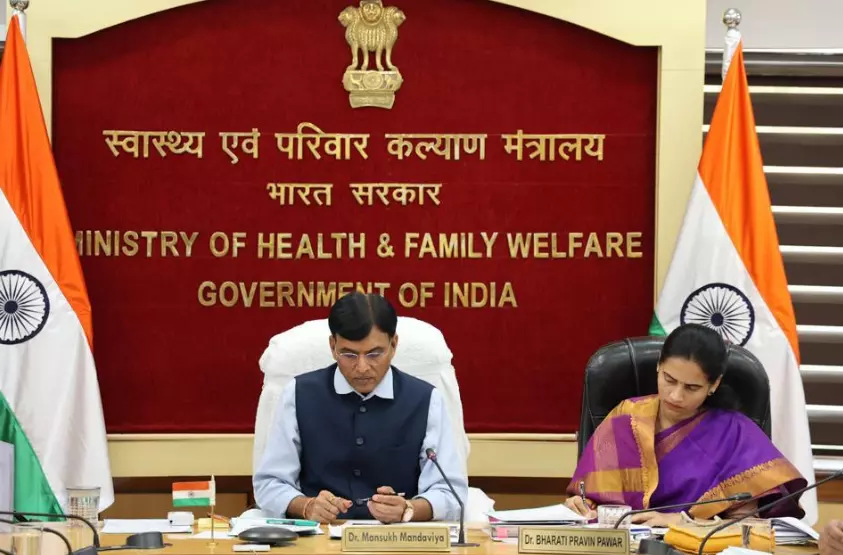
COVID: As cases rise, Centre asks states to ramp up testing, keep hospitals ready

Amid concerns over a quick spike in COVID-19 cases in the country, Union Health Minister Mansukh Mandaviya on Friday held an emergency review meeting and advised states to stay alert and be prepared for any eventualities.
During the meeting with his state counterparts as well as principal and additional chief secretaries, the health minister ordered immediate identification of COVID-19 hotspots by monitoring trends of influenza-like illness (ILI) and severe acute respiratory infection (SARI) cases. He also asked states and Union territories to ramp up testing and vaccination and ensure readiness of hospital infrastructure.
Also read: XBB.1.16 accounting for 38.2% of COVID-19 infection in India: INSACOG bulletin
Mandaviya emphasised on ramping up the whole genome sequencing of positive samples and creating awareness among people on COVID-19-appropriate behaviour.
“The Centre and the states need to continue working in collaborative spirit as was done during the previous surges for COVID-19 prevention and management,” Mandaviya said.
He also urged the state health ministers to conduct mock drills of all hospital infrastructure on April 10 and 11 and review the health preparedness with district administrations and health officials on April 8 and 9.
Eyes on XBB.1.5
States and Union territories were further informed that currently WHO is closely tracking one variant of interest (VOI), XBB.1.5 and six other variants are under monitoring (BQ.1, BA.2.75, CH.1.1, XBB, XBF and XBB.1.16), a health ministry statement said.
The statement said that while Omicron and its sub-lineages continue to be the predominant variant, most of the assigned variants have little or no significant transmissibility, disease severity or immune escape. The prevalence of XBB.1.16 increased from 21.6 per cent in February to 35.8 per cent in March, 2023.
However, no evidence of an increase in hospitalisation or mortality has been reported, the statement said.
During the meeting, it was observed that 23 states and Union territories had average tests per million below the national average.
Stress on five-fold strategy
Mandaviya said irrespective of the new variants, the five-fold strategy of Test-Track-Treat-Vaccinate and adherence to COVID-appropriate behaviour continue to remain the tested strategy for COVID management.
This would facilitate undertaking of appropriate public health measures, he said.
States and Union territories were also requested to expeditiously increase the rate of testing from the current rate of 100 tests per million, as on the week ending April 7. They were further advised to increase the share of RT-PCR in tests, the statement said.
The states and Union territories were briefed that the country has been witnessing a steady increase in COVID-19 cases with average daily cases rising to 4,188 in the week ending April 7 from 571 in the week ending March 17; and weekly positivity up to 3.02 per cent in the week ending April 7.
Also read: COVID-19 infection can change structure of our genes: Study
However, 88,503 daily average cases have been reported globally in the same time, with the top five countries contributing 62.6 per cent of global cases in the last one week, the statement said.
It was also informed that while India has achieved over 90 per cent coverage of primary vaccination, the coverage of precaution dose is very low.
Vaccinate elderly, vulnerable population first: Mandaviya
Mandaviya advised states and Union territories to ramp up vaccination of all eligible population, especially of the elderly and vulnerable population group.
It was also observed that eight states are reporting high number of COVID-10 cases in India with 10 or more districts reporting more than 10 per cent positivity in Kerala, Maharashtra and Delhi and over 5 districts reporting more than 5 per cent positivity in Karnataka, Kerala, Maharashtra, Delhi, Himachal Pradesh, Tamil Nadu and Haryana.
Mandaviya stressed on the importance of enhancing public awareness campaigns regarding adherence to COVID-appropriate behaviour. He requested all the state health ministers to personally monitor and review the preparedness of all logistics and infrastructure including availability of sufficient designated hospital beds and ensure that there is adequate stock of essential medicines.
States were also asked to regularly update their COVID data on the COVID India portal.
They were reminded of the joint advisory issued by the Union health ministry and ICMR to all states on March 25 which calls for a reinvigorated public health response to contain the surge of seasonal influenza and COVID cases through early detection, isolation, testing and timely management of suspected and confirmed cases to detect and contain outbreaks of new SARS-CoV-2 variants.
Mandaviya requested he states and Union territories to ensure effective implementation. There was comprehensive and detailed discussion on various aspects of COVID management including ramping up of hospital infrastructure; increased testing.
Puducherry Chief Minister N Rangaswamy, health ministers of Uttarakhand (Dhan Singh Rawat), Assam (Keshab Mahanta), Goa (Vishwajit Rane), Jharkhand (Banna Gupta), Madhya Pradesh (Prabhuram Choudhury), Punjab (Balbir Singh), Manipur (Sapan Ranjan Singh), Haryana (Anil Vij), Tamil Nadu (Thiru Ma Subramanian) and Telangana (Thanneeru Harish Rao) among others attended the meeting.
(With inputs from agencies)

